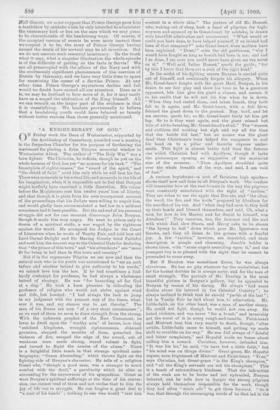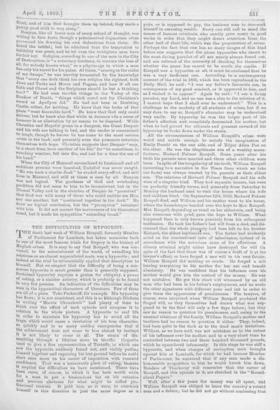"A KNIGHT-ERRANT OF GOD."
ON Friday week the Dean of Westminster, supported by the Archbishop of Canterbury, presided over a meeting in the Jerusalem Chamber for the purpose of furthering the movement for placing a John Bunyan memorial window in Westminster Abbey. The author of "The Holy War" was a born fighter. The Christian, be reflects, though be put on the whole harness of God, has yet "no armour for his back." "The breastplate of rightenusuess," the "sword of the spirit," and "time shield of faith" avail him only while lie will face his foe. There were moments in his actual life, and moments in the life of his imagination, when it is impossible not to feel that Bunyan might lawfully have exercised a little discretion. His valour before the Magistrates cost him twelve years' loss of liberty, and that though it is plain from his own transparent account of the proceedings that his Judges were willing to acquit him, and would gladly have accommodated a bad law to a militant conscience had it been possible. But the sad end of his personal struggle did not for one moment discourage John Bunyan, though it made him very angry. He went to prison only to dream of a spiritual strife, a war waged by the righteous against the world. He arraigned his Judges in the Court of Literature when he wrote of Vanity Fair, and told bow old Lord 'Carnal Delight and Sir Having Greedy tried Faithful and sent. him the nearest way to the Celestial Gate for declaring that "time prince of this town" and "his attendants" are "more fit for being in bell than in this town and country."
But if in the regenerate Pilgrim we see now and then the natural man who in his youth was accustomed to "set an oath before and another behind to give authority to his words," we cannot love him the less. If be had sometimes a fool- hardy , contempt for prudence, be had always a wholesome hatred of strategy. He was "for hazarding all for God at a clap." He took a. keen pleasure in ridiculing the professor of religion who would not strive against wind and tide,, but boasted: "1 bad always, the luck to jump in my judgment with the present way of time times, what- ever it was, and my chance was to get thereby." The men of his dream are men "of a very stout countenance "; as we read of them we seem to draw strength from the strong. With the unknown prophet of the New Testament, be loves to dwell upon the "worthy acts" of heroes, how they "subdued kingdoms, wrought righteousness, obtained promises, stopped the mouths of lions, quenched the violence of fire, escaped the edge of the sword, out of weakness were made strong, waxed valiant in fight, and turned to flight the armies of time aliens." There is a delightful little touch in that strange spiritual auto- biography, "Grace Abounding," which throws light on the fighting side of Bunyan's character. He tells of a religious friend who., "though a good man, was a stranger to much combat with the devil," a peculiarity which he cites as accounting for the narrowness of his sympathies. Great as were Bunyan's spiritual sufferings at the time of his conver- sion, one cannot read of them and not realise that to him the joy of life was in struggle. He can forgive a great deal to "a num of his bands " ; nothing to one Who would " rest him
content in a whole skin." The picture of old Mr. Honest, who, waking out of sleep, took a band of pilgrims for high- waymen and squared up to Great-heart by mistake, is drawn with heartfelt admiration and amusement. "What would or could you have done, to have helped yourself, if we indeed had been of that company " asks Groat-heart, when matters have been explained. " Done!" cries time old gentleman, "why I would have fought as long as breath had been in me; and had I so done, I am sure you could never have given me the worst on it." " Well said, father Honest," quoth the guide; "for by this I know that thou art a cock of the right kind?'
In the midst of his fighting scenes Bunyan is carried quite out of himself, and continually forgets his allegory. When 'Mr. Great-heart fought with the giant Maul, Bunyan, in his desire to see fair play and show his hero to be a generous opponent, lets him give the giant a ,chance, and counts it to his credit that be will not hit him when be is down. " When they lied rested them, and taken breath, they both fell to it again, and Mr. Greet-heart, with a full blow, fetched the giant down to the ground. Nay, hold, and let me recover, quoth he ; so Mr. Great-heart fairly let him get hip. So to it they went again, and the giant missed but ittle of all-to-breaking Mr. Great-heart's skull." The "women and children ,did nothing but sigh and cry all the time that time battle did last," but no sooner was the giant dead than Christiana's boys helped the conqueror to nail his head oh to a pillar and inscribe rhymes under- neath. This fight is almost better told than the famous one which Christian bad with Apollyon, though it lacks, the picturesque opening so suggestive of time enormous' size of the monster. " Then Apollyon straddled quite over the whole breadth of the way, and said, I am void of fear."
A curious boyishness—a sort of ferocious high spirits— shows itself now and then in all Bunyan's work. Our readers will remember how at the rest-houses in the way the pilgrims were constantly entertained with time sight of "rarities.' They are taken to see the apple that Eve ate, and "time altar, the wood, the fire, and the knife " prepared by Abraham for time sacrifice of his son. And "when they bad seen it, they held up their bands and blessed themselves, and said, Oh, what a man for love to his Master, and for denial to himself, was Abraham!" They examine, too, the hammer and the nail with which .Tael slew Sisera, and Meru asks to be shown "the byway to hell" down which poor Mr. Ignorance was thrown, and they all listen to the groans with a fearful joy. A few "rarities," however, are beautiful, and their description is simple and charming. Jacob's ladder is shown them, with " some angels ascending upon it," and the youngest boy is so pleased with the sight that he cannot be persuaded to come away.
But if Bunyan was sometimes fierce, be was always chivalrous. He has no pity whatever for the misbeliever, but for the honest doubter he is always sorry, and for the man of small strength. The portrait of Mr. Fearing is the most beautiful picture in Bunyan's gallery, but he appealed to Bunyan by reason of his daring. He always "had some doubts about his interest in the Celestial Conntry"; be always inclined to think that he should "perish at the last "; but in Vanity Fair he laid about him to admiration. Mr. Little-faith, on the other band, was a man of another stamp.
He could not fight, though be would not run away. He hated violence, and was never "for a brush," and invariably got the worst of it in every rough-and-tumble. Faint-hearb
and Mistrust beat him very nearly to death, though, "after awhile, Little-faith came to himself, and getting up made
shift to scrabble on his way." He was full always of "doleful and bitter complaints," and Hopeful made no bones about calling him a coward. Christian, however, defended him.
"It was his lot," he said, "to have but a little faith," but " his mind was on things divine." Great-grace, Mr. Hopeful argues, soon frightened off Mistrust and Faint-heart. "True," says Christian, but Great-grace "is the King's champion,"
end "all the King's servants are not his champions." Thig is a touch of extraordinary kindness. That the infirmities of the weak are to be borne and not upbraided, Bunyan believed, and he tells how in danger the strong pilgrime always held themselves responsible for the weak, though they had often " much ado" to Ilet theta forward. " So it Was, that through the encouraging words of he that led in the front, and of him that brought them up behind, they made a Pretty good shift to wag along." Bunyan, like all brave men of every school of thought, was willing to face facts, though a prOconcei ved dogmatism often Prevented his drawing his own deductions from them. He hated the infidel ;, but he admitted that the temptation to infidelity was great, and be let even the irreligious man have his fair say. Religion, according to one of the men in the City of Destruction, is "a voluntary fondness, to venture the loss of all, for nobody knows what," or a pilgrimage in which a man
has only his travel for his pains. At times, " in in the. midst of my dumps," he was terribly tormented by the knowledge that "every one doth think his own religion the lightest, both Jews and Turks and Moors and Pagans, and how if all our faith and Christ and the Scriptures should be bat a thinking too P" He had seen terrible things in the Valley of the Shadow of Death, "things which cared not for Christian's sword as Apollyon did." He had not been in Doubting Castle, either, for nothing. He knew that the locker of that place "went damnable hard." He knew that Goa only could deliver, but be knew also that while in durance vile a sense of humour is an alleviation by no means to be despised. While Christian and Hopeful groan in a dungeon, the Giant Despair and his wife are talking in bed, and the reader is constrained to laugh, though he knows he has come to the most serious crisis in the book, and presently even the prisoners entertain themselves With hope. Christian suggests that Despair" may, in a short time, have another of his tits," for "he sometimes, in sunshiny weather, fell into fits, and lost for a time the use of his band."
When the City of Minimal surrendered to Immanuel and all seditious persons were banished, Unbelief was never caned. "Re was such a nimble Jaelc " he evaded every effort., and still lives in Mansoul, and still at times is seen by all. Bunyan as not logical. The goodness of God and everlasting Perdition did not seem to him to be inconsistent, but in the. Dismal Valley and in the clutches of Despair he "perceived" that God was with many of those who could neither see Him nor one another, but "continued together in the dark." He drew no logical conclusion, but the "perception" remained With him. It did not correct the narrowness of his theoretical Creed, but it made his sympathies "exceeding broad."











































 Previous page
Previous page